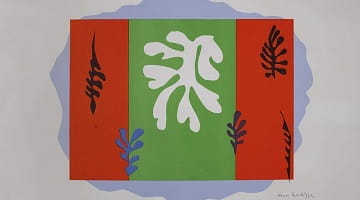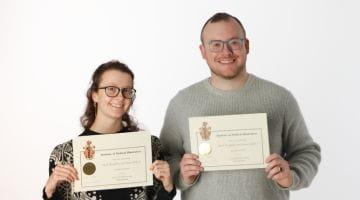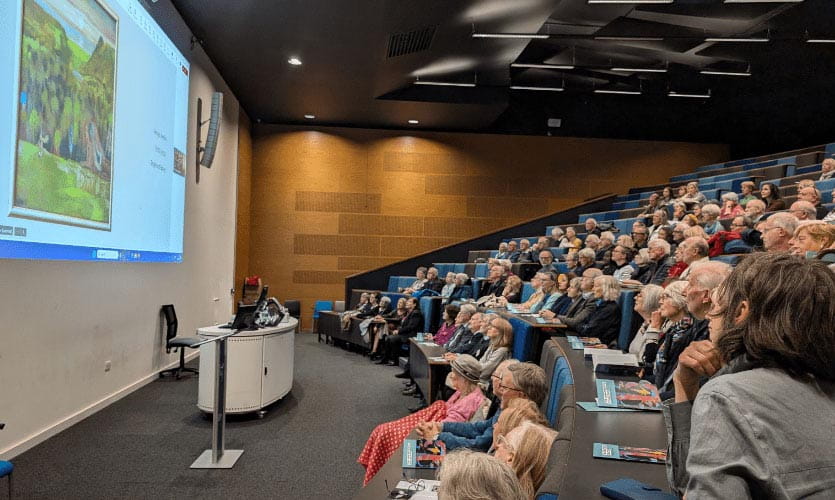2025/26 entry
BA (Hons) Fine Art
Why study Fine Art at Liverpool John Moores University?
- Take a virtual tour of this year's Fine Art degree show
- Join a studio based learning community in which you are supported to develop the skills and knowledge to become a fully fledged artist and arts professional in the future
- Opportunities to explore, test and deploy a wide range of materials and practices including: drawing, painting, printmaking, sculpture, photography, film, performance, installation, digital arts production and art writing
- A platform to engage in the arts ecology of the city of Liverpool and gain 'real world ' experience and knowledge pertinent to careers in the arts
- Develop the skills to engage with a range of potential audiences and present your practice professionally in exhibitions and events
About your course
The BA (Hons) Fine Art at Liverpool John Moores University is unique in its focus on making artwork and presenting artwork.
Boasting more museums and galleries than any other city in the UK outside London, Liverpool is a rich cultural field and home to institutions like Tate Liverpool, Liverpool Biennial, FACT, Bluecoat and Walker Art Gallery.
In your day-to-day studio practice you have the freedom to work in any media you choose, refining your skills and working on realising your individual vision, with help from your tutors who are always on hand to offer advice. You will be offered advice on exhibiting your work with in-depth insight into the field of curating. The programme will allow you to gain confidence and to work at professional standards of practice.
Hear our students talking about their experience on the BA (Hons) Fine Art
"The Fine Art programme at LJMU was an exciting experience and opportunity to develop my work in a professional and friendly environment. Great technical support and facilities enabled me to experiment with a variety of media and learn new skills. The course created possibilities to connect with various institutions and organisations which I am finding beneficial today."
Fees and funding
There are many ways to fund study for home and international students
Fees
The fees quoted above cover registration, tuition, supervision, assessment and examinations as well as:
- library membership with access to printed, multimedia and digital resources
- access to programme-appropriate software
- library and student IT support
- free on-campus wifi via eduroam
Additional costs
Although not all of the following are compulsory/relevant, you should keep in mind the costs of:
- accommodation and living expenditure
- books (should you wish to have your own copies)
- printing, photocopying and stationery
- PC/laptop (should you prefer to purchase your own for independent study and online learning activities)
- mobile phone/tablet (to access online services)
- field trips (travel and activity costs)
- placements (travel expenses and living costs)
- student visas (international students only)
- study abroad opportunities (travel costs, accommodation, visas and immunisations)
- academic conferences (travel costs)
- professional-body membership
- graduation (gown hire etc)
Funding
There are many ways to fund study for home and international students. From loans to International Scholarships and subject-specific funding, you'll find all of the information you need on our specialist funding pages.
Employability
This programme opens lots of opportunities to develop your professional practice.
There are many opportunities for contemporary artists who are building their own professional practice. You may be able to apply for grants, and supplement your income by running workshops for galleries and museums, taking up residencies, working collaboratively with other artists and artists groups, managing projects within the cultural sector and curating exhibitions and shows.
Student Futures - Careers, Employability and Enterprise Service
A wide range of opportunities and support is available to you, within and beyond your course, to ensure our students experience a transformation in their career trajectory. Every undergraduate curriculum includes Future Focus during Level 4, an e-learning resource and workshop designed to help you to develop your talents, passion and purpose.
Every student has access to Careers Zone 24/7, LJMU's suite of online Apps, resources and jobs board via the LJMU Student Futures website. There are opportunities for flexible, paid and part-time work through Unitemps, LJMU's in-house recruitment service, and we also offer fully funded Discovery Internships.
One-to-one careers and employability advice is available via our campus-based Careers Zones and we offer a year-round programme of events, including themed careers and employability workshops, employer events and recruitment fairs. Our Start-Up Hub can help you to grow your enterprise skills and to research, plan and start your own business or become a freelancer.
A suite of learning experiences, services and opportunities is available to final year students to help ensure you leave with a great onward plan. You can access LJMU's Careers, Employability and Start-up Services after you graduate and return for one-to-one support for life.
Go abroad
LJMU aims to make international opportunities available to every student. You may be able to study abroad as part of your degree at one of our 100+ partner universities across the world. You could also complete a work placement or apply for one of our prestigious worldwide internship programmes. If you wanted to go abroad for a shorter amount of time, you could attend one of our 1-4 week long summer schools.
Our Go Citizen Scheme can help with costs towards volunteering, individual projects or unpaid placements anywhere in the world. With all of these opportunities at your feet, why wouldn’t you take up the chance to go abroad?
Find out more about the opportunities we have available via our Instagram @ljmuglobalopps or email us at: goabroad@ljmu.ac.uk.
A life-changing experience
There's so much more to university than just studying for a degree.
News and views
Browse through the latest stories and updates from the University and beyond
What you will study on this degree
Please see guidance below on core and option modules for further information on what you will study.
This course is currently undergoing its scheduled programme review, which may impact the advertised modules. Programme review is a standard part of the University’s approach to quality assurance and enhancement, enabling us to ensure that our courses remain up to date and maintain their high standard and relevancy.
Once the review is completed, this course website page will be updated to reflect any approved changes to the advertised course. These approved changes will also be communicated to those who apply for the course to ensure they wish to proceed with their application.
Further guidance on modules
Modules are designated core or optional in accordance with professional body requirements, as applicable, and LJMU’s Academic Framework Regulations. Whilst you are required to study core modules, optional modules provide you with an element of choice. Their availability may vary and will be subject to meeting minimum student numbers.
Where changes to modules are necessary these will be communicated as appropriate.
Level 4
Core modules
Building a Vocabulary
40 credits
The aim of this module is to introduce you the role of collaborative and individual practice within the culture of Fine Art. You will be introduced to a variety of approaches in order to develop and produce contemporary Fine Art practices.
Form and Purpose
40 credits
This module will introduce you to self-directed contemporary art practice and familiarise you with a broader context of contemporary Fine Art issues and introduce you to the notion of studio practice towards the production and distribution of contemporary Fine Art practice.
Introducing Criticality 1
20 credits
You will critically reflect on your own engagement with Fine Art practices, relating to your own studio practice via the upkeep of a blog and writing of an essay.
Introducing Criticality 2
20 credits
You will critically reflect on your own engagement with Fine Art practices, relating to your own studio practice via the upkeep of a blog, writing of an essay with self reflection skills.
Level 5
Core modules
Practice and Experimentation
40 credits
This module aims to increase your ability to learn your own unique practice within the wider context of the Visual Arts and to develop the practical and critical skills relevant to this practice through experimentation and analysis of successes and failures.
Practice and Production
40 credits
Within this module you will consider the appropriateness, mode and situation of media used in Contemporary Fine Art Practice so that you can consider the role that audiences and peers play in the production and distribution of contemporary art practice. Students will also undertake a tutor led project introducing them to a range of approaches, practices and research activities undertaken professionally by the staff team.
Criticality 1
20 credits
The aim of this module is to advance the students critical independent understanding of Contemporary Fine Art practice, methodologies and contexts and relate this learning to their own emerging studio practice through the writing of a statement and an essay.
This module requires students to critically and professionally reflect on their engagement with art both historically and contemporaneously, relating it to their own studio practice. This is done via the writing of a self reflexive statement and through the writing of an essay, based on an on-going engagement and reflection of the lectures, seminars, of visits to galleries, exhibitions and other relevant cultural events.
Criticality 2
20 credits
This module requires you to critically and professionally reflect on your engagement with art both historically and contemporaneously, using a variety of theoretical approaches to explore issues of representation in visual culture, with particular reference to class, race, gender the recent debates within the field of visual culture and critical theory relating to contemporary art. This is related to your own studio practice by the writing of an essay and a report. The module prepares the students for the Level 6 research publication and in the development of their critical statements and viva.
Optional Modules
Study Semester Abroad - Fine Art
60 credits
The aim is to provide students with a semester of study at an approved overseas partner that will replace one semester of their LJMU programme at level 5.This is a semester of full-time study at an approved higher education institution which will replace one semester of level 5 study at LJMU. The modules to be studied must be agreed in advance, and must be an appropriate substitute for the modules being replaced. Assuming successful completion of this semester, mark-bearing credit will be awarded by the Faculty Recognition Group. The grade conversion scale to be used will be made available in advance of the semester abroad.
Level 6
Core modules
Advanced Practice: Portfolio
40 credits
This module will equip students with an awareness of postgraduate courses, career focus and professional practice through developing a personal development portfolio. The portfolio will include professional documentation of selected art works, an artist statement and a CV. The portfolio will be produced in an appropriate digital form such as a PDF or website and be focussed towards future ambitions and appropriate opportunities.
Students will focus on various ideas of research towards the development of contemporary Fine Art practice.
Advanced Fine Art Practice: Exhibition
60 credits
The aim of this module is to equip students with the practical, intellectual and interpersonal skills necessary for careers as professional artists and in high skilled employment, by producing and distributing contemporary Fine Art practice in a public setting at a professional level.
Critical Research and Publication
20 credits
This module will help students develop the ability to plan and propose an independent research project in the context of their artistic practice. During the module, students are required to plan, implement and complete a sustained period of research, consulting academic and professional publications, artworks, exhibitions, archives, performances, workshops, broadcasts etc, as is appropriate to the project and in agreement with a supervising tutor. Projects may take the form of a written essay of 3,000 words with accompanying bibliography, or a research portfolio with accompanying written report of 1,500 words plus bibliography. Projects will critically and contextually locate the student’s art practice within the wider disciplinary field, and promote the application of specific and transferable skills in a professional environment.
Teaching and work-related learning
Excellent facilities and learning resources
We adopt an active blended learning approach, meaning you will experience a combination of face-to-face and online learning during your time at LJMU. This enables you to experience a rich and diverse learning experience and engage fully with your studies. Our approach ensures that you can easily access support from your personal tutor, either by meeting them on-campus or via a video call to suit your needs.
Regular tutorials, group reviews of your work and visits to local exhibitions and events will really help you to develop as an artist and place your work in a professional context. You will also be expected to attend a rigorous programme of lectures, seminars, workshops and critiques, and there will be ongoing training and workshops in digital audio and video production, sculpture and 3D construction, digital studio photography and film, printmaking, 3D printing, textile work and painting, supported by our expert technical teams.
Work-related Learning
The degree offers opportunity for students to present their work in exhibitions during the three years of study, compared to most degree courses that will not do more than a single degree show.
As Liverpool has more museums and galleries than any UK city outside London, there can be few better places in which to study Fine Art. Against this rich cultural backdrop, the Fine Art degree is near a huge range of contemporary art institutions in the city including Tate Liverpool, Liverpool Biennial, Walker Art Gallery and FACT.
Our renowned teaching staff, including artists, curators and writers, can provide key career advice by drawing from their own strong track records, many of whom have worked internationally and continue to do so.
Support and guidance
Dedicated personal tutor, plus study skills support
If you decide to pursue a Fine Art degree at LJMU, you will join a friendly and supportive department in which you will be encouraged to develop your creative talent and to also view your own and others work with a critical eye. Continual peer review and the constant guidance of your tutors are designed to help you be the very best in your particular artistic discipline. The course also offers you a consistently high contact rate.
Assessment
Assessment varies depending on the modules you choose, but will usually include a combination of exams and coursework.
The primary methods of assessment are a presentation of your work to fellow students and staff or submission/installation of a portfolio of practical projects with supporting research and development work.
The way you do this depends on the kind of work you do, but we always ensure that the process is friendly and supportive and that portfolio submissions are done in the studio. Other forms of assessment include written essays, reviews, proposals, reports, a personal development planning folder and a CV and/or blog.
Your tutors will schedule individual tutorials to help you prepare for assessments, but they will also be continually on hand to help you evaluate your work and assess your progress. Verbal feedback is given during review and critique activities and at the end of individual tutorials.
You will also receive written feedback with an indication of your marks for reviews and presentations within three weeks of submitting work, although this may take longer if the marks go through an external moderation and approval process.
Course tutors
Our staff are committed to the highest standards of teaching and learning
Facilities
What you can expect from your School
Rated a Top 10 Art School in the 2021 Guardian University League Tables.
Cross-disciplinary learning in art and design subjects takes place in the Liverpool School of Art and Designs John Lennon Art and Design Building, based in the Mount Pleasant Campus. Here students studying a variety of disciplines, including Architecture, Art in Science, Exhibition Studies, Fashion, Fine Art, Graphic Design, History of Art and Museum Studies and Interior Architecture, will have the opportunity to develop their work in state-of-the-art workspaces and facilities within a stimulating and critically demanding environment.
Entry requirements
Please choose your qualifications below to view requirements
Grades/points required from qualifications: BBC-ABB (112-128)
Qualification requirements
GCSEs and equivalents
A levels
BTECs
Extended Diploma: DMM-DDM
Access awards
International Baccalaureate
Acceptable on its own and combined with other qualifications
OCR Cambridge Technical
Extended Diploma: DMM-DDM
Irish awards
Acceptable on its own and combined with other qualifications
T levels
Additional requirements
-
Interview required
Shortlisted applicants will be required to produce a portfolio and be invited to interview
International requirements
-
IELTS
6.0 overall with no component below 5.5, taken within two years of the course start date.https://www.ljmu.ac.uk/study/courses/international-entry-requirements
Please Note: All international qualifications are subject to a qualification equivalency check.
Application and selection
Securing your place at LJMU
UCAS is the official application route for our full-time undergraduate courses. Further information on the UCAS application process can be found here https://www.ljmu.ac.uk/study/undergraduate-students/how-to-apply.
- An enthusiasm for Art & Design based subjects
- Capable of discussing Art & Design issues
- The ability to analyse and reflectively criticise
- Visual awareness
Assessment of suitability to the course will include a review of a portfolio of work (portfolio guidance) and interview.
The university reserves the right to withdraw or make alterations to a course and facilities if necessary; this may be because such changes are deemed to be beneficial to students, are minor in nature and unlikely to impact negatively upon students or become necessary due to circumstances beyond the control of the university. Where this does happen, the university operates a policy of consultation, advice and support to all enrolled students affected by the proposed change to their course or module.
Further information on the terms and conditions of any offer made, our admissions policy and the complaints and appeals process.











